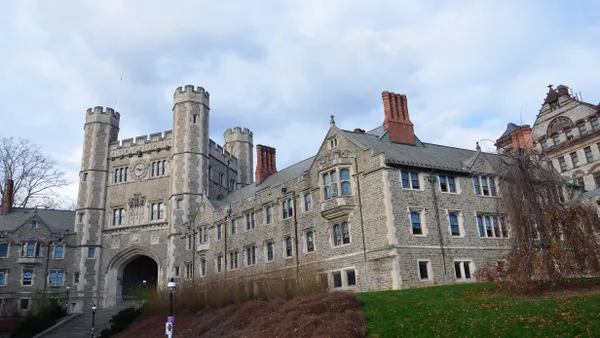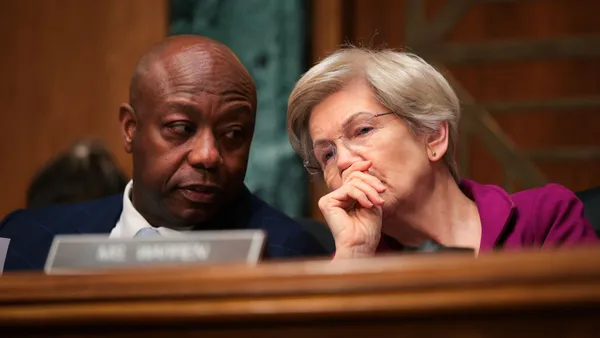Dive Brief:
- New Jersey Gov. Phil Murphy announced Thursday a new legislative package aimed at strengthening the fiscal responsibility of public colleges in the state.
- A first bill would require New Jersey's public colleges to submit fiscal monitoring reports annually and undergo comprehensive audits every three years, as well as give the state secretary of higher education more oversight authority to order audits or monitoring. Other bills would require colleges to publicly post financial reports and require board members to undergo training about their oversight duties.
- The move comes after several financial blowups at New Jersey public institutions, most notably at New Jersey City University, which declared a financial emergency last summer and sought $10 million from the state. The scandal resulted in the resignation of the university's president and an ongoing investigation ordered by Murphy, a Democrat.
Dive Insight:
If passed, the bills might help New Jersey avoid a precipitous collapse of public institutions, said Eddy Conroy, a senior adviser for education policy at liberal think tank New America. Financial monitoring reports could help the state either put a stressed institution in a better financial place, or close it gracefully over time.
Though New Jersey City University has not closed, it announced last month it would be reducing its academic portfolio by 37% — closing 111 programs. Up to 30 tenured and 19 untenured faculty members were laid off or had contracts not renewed. That followed the reduction of 41% of the university's management staff during the pandemic and the elimination of five athletic programs.
Financial records from the university reveal that liabilities increased by $146 million in 2015 after the adoption of new accounting standards that required the institution to report pension liabilities. From 2017 to 2022, the college lost 20% of its students and 14% of its net student revenue, according to Fitch Ratings.
Andrés Acebo, the interim president of New Jersey City University who was named to the role last week, said the college welcomes transparency.
“NJCU welcomes and applauds every legislative effort to strengthen higher education in our state — especially the proactive engagement of the State to address disparate institutional needs,” he said via email.
A spokesperson for the university said the institution self-identified its financial issues and has addressed the fiscal situation head-on.
NJCU has publicly posted annual financial statements going back to 2002 and audited statements going back to 2015.
Quite a few other states have requirements similar to those Murphy introduced, said Robert Kelchen, a higher education professor at the University of Tennessee, Knoxville. Kelchen previously worked at Seton Hall University, a nonprofit institution in New Jersey.
Compared to situations in other states, the New Jersey secretary of higher education has limited power, he said. That means if the state wants more oversight, the legislature will have to act.
Undergoing comprehensive audits will come with a price tag for those public institutions that aren’t already hiring auditors. But Jonathan Koppell, president of Montclair State University, a public institution in New Jersey, said he applauded the increased oversight.
“Our students and their families should have a clear picture of the institutions they have chosen to attend as should the faculty and staff who serve them,” he said via email. “And we are incredibly proud of the return on investment we offer New Jersey taxpayers who support our work because it advances our state.”
Koppell said Montclair’s “careful financial stewardship” allowed it to sign a deal to absorb the nearby Bloomfield College when the private institution was facing closure last year.
Todd Wolfson, vice president of the Rutgers University union for full-time faculty, graduate workers and postdoctoral associates, said he is glad the governor is stepping in.
“We really applaud Gov. Murphy working to hold Rutgers accountable,” said Wolfson, a journalism and media studies professor. “We need sunlight and transparency.”
Financial reports showed the Rutgers athletics program rang up a deficit of $73 million in the 2021 fiscal year. Direct subsidies from the university doubled to $27.6 million, USA Today reported.
A spokesperson for the state flagship said via email that the university is reviewing the bill package and “appreciates the sponsors’ and the Administration’s interest in the financial stability of New Jersey’s public colleges and universities.”
In 2021, another New Jersey public institution, William Paterson University, announced a $30 million deficit and a plan to lay off nearly 100 full-time professors.
“We welcome and share the commitment to transparency,” a university spokesperson said via email. “As proposed, these bills should not affect our operations at William Paterson University, as we already post most, if not all, of this information to our website or submit it to the state.”
Editor’s note: This brief has been corrected to accurately describe New Jersey City University's management staff reductions.













